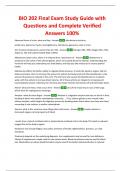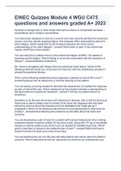BIO 202 Final Exam Study Guide with
Questions and Complete Verified
Answers 100%
Abnormal items of urine- what are they - Answer -bilirubinuria,nitrituria,
proteinuria, ketonuria, Pyuria, Hemoglobinuria, Hematuria, glycosuria, casts in urine
Airs chemical components- percent N2, O2, CO2 - Answer -Nitrogen (N2, 78%), Oxygen (O2, 21%),
Argon (A, 1%) and Carbon Dioxide (CO2, 0.04%).
Aldosterone-what is this, where is it released from, importance of - Answer -Aldosterone is
produced in the cortex of the adrenal glands, which are located above the kidneys. Understanding this
hormone will help you understand your body better, and help you take measures to ensure optimal
health.
Aldosterone affects the body's ability to regulate blood pressure. It sends the signal to organs, like the
kidney and colon, that can increase the amount of sodium the body sends into the bloodstream or the
amount of potassium released in the urine. The hormone also causes the bloodstream to re-absorb
water with the sodium to increase blood volume. All of these actions are integral to increasing and
lowering blood vessels. Indirectly, the hormone also helps maintain the blood's pH and electrolyte levels.
Alveoli- what are these, what occurs here - Answer -any of the many tiny air sacs of the lungs
which allow for rapid gaseous exchange.
Amylase- what do these digest - Answer -Amylase is a digestive enzyme that acts on starch in food,
breaking it down into smaller carbohydrate molecules. ... First, salivary glands in your mouth make
salivary amylase, which begins the digestive process by breaking down starch when you chew your food,
converting it into maltose, a smaller carbohydrate.
Anemia- what is this, what are some things that could cause - Answer -simply indicates a
decreased oxygen-carrying capacity of blood
results from a lack of red blood cells or dysfunctional red blood cells in the body. This leads to reduced
oxygen flow to the body's organs.
Symptoms may include fatigue, skin pallor, shortness of breath, lightheadness, dizziness, or a fast
heartbeat.
Treatment depends on the underlying diagnosis. Iron supplements may be used for iron deficiency.
Vitamin B supplements maybe used for low vitamin levels. Blood transfusions may be used for blood
loss. Medications to induce blood formation may be used if the body's blood production is reduced.
, Antherosclerosis- what is this - Answer -A build up of cholesterol plaque in the walls of arteries
causing obstruction of blood flow. Plaques may rupture causing acute occlusion of the artery by clot.
Atherosclerosis often has no symptoms until a plaque ruptures or the buildup is severe enough to block
blood flow.
A healthy diet and exercise can help. Treatments include medications, procedures to open blocked
arteries and surgery.
Antidiuretic hormone- what is this, what does it work on/ control, what produces it - Answer -ADH
prevents wide swings in water balance, helping the body avoid dehydration and water overload.
The most important variable regulating antidiuretic hormone secretion is plasma osmolarity, or the
concentration of solutes in blood. Osmolarity is sensed in the hypothalamus by neurons known as an
osmoreceptors, and those neurons, in turn, stimulate secretion from the neurons that produce
antidiuretic hormone.
Antigens- what are these - Answer -a toxin or other foreign substance that induces an immune
response in the body, especially the production of antibodies.
Arteries- what are they, why can they handle high pressure flow - Answer -The arteries are the
large blood vessels that carry blood from the heart to all the organs and muscles of the body, to give
them the energy and oxygen they need. The arteries manage the flow of blood by controlling the speed
and direction it flows in.
To cope with this pressure, the artery walls contain tiny muscles to hold them in shape and allow them
to become wider or narrower.
Opening and closing different arteries affects your blood pressure. The more narrow your arteries are,
the less space there is for your blood to flow in and the harder it pushes against the arteries' walls.
Atrial/ventral? depol/repol? - Answer -atrial depolarization P wave, ventral repel QRS wave
Baroreceptors- what are they/what changes do they detect - Answer -Baroreceptors are
mechanoreceptors located in the carotid sinus and in the aortic arch. Their function is to sense pressure
changes by responding to change in the tension of the arterial wall. The baroreflex mechanism is a fast
response to changes in blood pressure.
Bicarbonate ion- what does this do in the body (blood) - Answer -CO2 is transported as
bicarbonate ions in the blood. Delivering O2 to the tissues is only half of the respiratory function of the
blood. The blood also must take carbon dioxide, a metabolic waste product, away from the tissues
Bile- what is this/what does this do - Answer -excreting cholesterol from the body, too much
cholesterol or too few bile salts allows the cholesterol to crystalize forming gallstones
treatments dissolving the crystals with drugs, pulverizing them with ultra sound vibrations, vaporizing
them with lasers , or surgical removal of gallbladder if removed bile duct enlarges to assume bile storing
role





